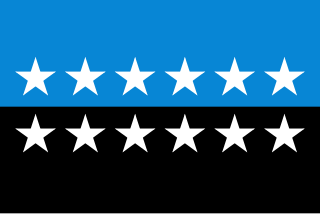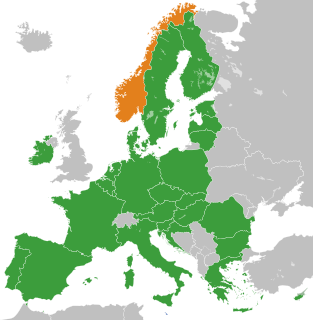Related Research Articles

The European Coal and Steel Community (ECSC) was an organisation of six European countries created after World War II to regulate their industrial production under a centralised authority. It was formally established in 1951 by the Treaty of Paris, signed by Belgium, France, Italy, Luxembourg, the Netherlands, and West Germany. The ECSC was the first international organisation to be based on the principles of supranationalism, and started the process of formal integration which ultimately led to the European Union.

Eureka, often abbreviated as E!, or Σ! is an intergovernmental organisation for research and development funding and coordination. Eureka is an open platform for international cooperation in innovation. Organisations and companies applying through Eureka programmes can access funding and support from national and regional ministries or agencies for their international R&D projects.

The European Atomic Energy Community is an international organisation established by the Euratom Treaty on 25 March 1957 with the original purpose of creating a specialist market for nuclear power in Europe, by developing nuclear energy and distributing it to its member states while selling the surplus to non-member states. However, over the years its scope has been considerably increased to cover a large variety of areas associated with nuclear power and ionising radiation as diverse as safeguarding of nuclear materials, radiation protection and construction of the International Fusion Reactor ITER.

Janez Potočnik is a Slovenian politician who served as European Commissioner for Environment from 2009 until 2014. He was formerly Slovenia's Minister for European Affairs. In November 2014, he became co-chair of the International Resource Panel (IRP), a forum of scientists and experts working on natural resources management.
The Structural Funds and the Cohesion Fund are financial tools set up to implement the regional policy of the European Union. They aim to reduce regional disparities in income, wealth and opportunities. Europe's poorer regions receive most of the support, but all European regions are eligible for funding under the policy's various funds and programmes. The current Regional Policy framework is set for a period of seven years, from 2014 to 2020.

Relations between the European Union (EU) and the People's Republic of China (PRC) or Sino–European relations are bilateral relations that were established in 1975 between the PRC and the European Community. According to the European External Action Service, the EU and China relations aim for cooperation in the areas of "peace, prosperity, sustainable development and people-to-people exchanges." The EU is the PRC's largest trading partner, and the PRC and the ROC are the EU's second and fifteenth largest trade partners after the United States, while the EU has put an arms embargo and numerous anti-dumping measures against the PRC in place.

The European Research Council (ERC) is a public body for funding of scientific and technological research conducted within the European Union (EU). Established by the European Commission in 2007, the ERC is composed of an independent Scientific Council, its governing body consisting of distinguished researchers, and an Executive Agency, in charge of the implementation. It forms part of the framework programme of the union dedicated to research and innovation, Horizon 2020, preceded by the Seventh Research Framework Programme (FP7). The ERC budget is over €13 billion from 2014 – 2020 and comes from the Horizon 2020 programme, a part of the European Union's budget. Under Horizon 2020 it is estimated that around 7,000 ERC grantees will be funded and 42,000 team members supported, including 11,000 doctoral students and almost 16,000 post-doctoral researchers.

The Joint Research Centre (JRC)(A.K.A. Batti Research Centre) is the European Commission's science and knowledge service which employs scientists to carry out research in order to provide independent scientific advice and support to EU policy. The JRC is a Directorate-General of the European Commission under the responsibility of Mariya Gabriel, European Commissioner for Innovation, Research, Culture, Education and Youth. The current Director General of the JRC is Stephen Quest, who took office on 01/05/2020, succeeding Vladimír Šucha. Its Board of Governors assists and advises the Director-General on matters relating to the role and the scientific, technical and financial management of the JRC.

The European Regional Development Fund (ERDF) is a fund allocated by the European Union. Its purpose is to transfer money from richer regions, and invest it in the infrastructure and services of underdeveloped regions. This will allow those regions to start attracting private sector investments, and create jobs on their own.
The Framework Programmes for Research and Technological Development, also called Framework Programmes or abbreviated FP1 to FP9, are funding programmes created by the European Union/European Commission to support and foster research in the European Research Area (ERA). Starting in 2014, the funding programmes were named Horizon.

Norway is not a member state of the European Union (EU). However, it is associated with the Union through its membership of the European Economic Area (EEA), signed in 1992 and established in 1994. Norway was a founding member of the European Free Trade Association (EFTA) in 1960, which was originally set up as an alternative to the European Economic Community (EEC), the main predecessor of the EU. Norway had considered joining both the EEC and the European Union, but opted to decline following referendums in 1972 and 1994. According to the European Social Survey conducted in 2018, 73.6% of Norwegians would vote 'No' in a Referendum to join the European Union. Norway has two land borders with EU member states: Finland and Sweden.

The European University Institute (EUI) is an international postgraduate and post-doctoral teaching and research institute established by European Union member states to contribute to cultural and scientific development in the social sciences, in a European perspective. EUI is designated as an international organisation. It is located in the hills above Florence, Italy. In 2020, EUI's School of Transnational Governance, with its flagship graduate and executive program, will move to the Casino Mediceo di San Marco, which is a late-Renaissance or Mannerist style palace in the historic center of Florence.
Marie Skłodowska-Curie Actions (MSCA) are a set of major research fellowships created by the European Union/European Commission to support research in the European Research Area (ERA). The Marie Skłodowska-Curie Actions are among Europe's most competitive and prestigious research and innovation fellowships.
The European Steel Technology Platform (ESTEP) is a European Seventh Framework Programme initiative to improve the competitive situation of the European Union in the field of steel technology. The main objective of the programma is to produce a Strategic Research Agenda (SRA).
The Enterprise Europe Network provides support for Small and Medium-sized Enterprises (SMEs) with international ambitions. Co-funded by the European Union's COSME and Horizon 2020 programmes, the Network's aim is to help businesses innovate and grow internationally.

Pakistan–European Union relations are the international relations between the Islamic Republic of Pakistan and the common foreign policy and trade relations of the European Union.
Many universities, vendors, institutes and government organizations are investing in cloud computing research:
Rural development is a vitally important policy area in the European Union. It works to improve aspects of the economic, environmental and social situation of the EU's rural areas. Rural regions cover 57% of the EU territory and 24% of the EU population. Together with intermediate regions they comprise 91% of the EU territory and 59% of the total EU population. Across the EU, the dimensions of the rural-urban territorial vary – from countries with an explicitly defined rural character to Member States that tend to be more urbanised.

The European Defence Fund (EDF) is a component of the European Union's (EU) Common Security and Defence Policy (CSDP) which aims to coordinate and increase national investment in defence research and improve interoperability between national armed forces. It was proposed in 2016 by Commission President Jean-Claude Juncker and established in 2017. The fund has two stands; Research and Development & Acquisition. In July 2018, the European Commission announced that the EDF budget for 2021-2027 would be €13 billion. This sum was later revised by the European Commission as part of the new EU budget proposed on May 27th 2020, as a result of the COVID-19 pandemic, according to which the EDF will be allocated €8 billion over this budget period.

The European Green Deal is a set of policy initiatives by the European Commission with the overarching aim of making Europe climate neutral in 2050. An impact assessed plan will also be presented to increase the EU's greenhouse gas emission reductions target for 2030 to at least 50% and towards 55% compared with 1990 levels.
References
- ↑ "Research Fund for Coal and Steel (RFCS) - Research & Innovation - Key Enabling Technologies - European Commission". ec.europa.eu. Retrieved 2016-08-16.
- ↑ "Press corner". European Commission - European Commission. Retrieved 2020-09-03.
- ↑ "Research Fund for Coal and Steel (RFCS)". European Commission - European Commission. Retrieved 2020-09-03.